Integral Movies
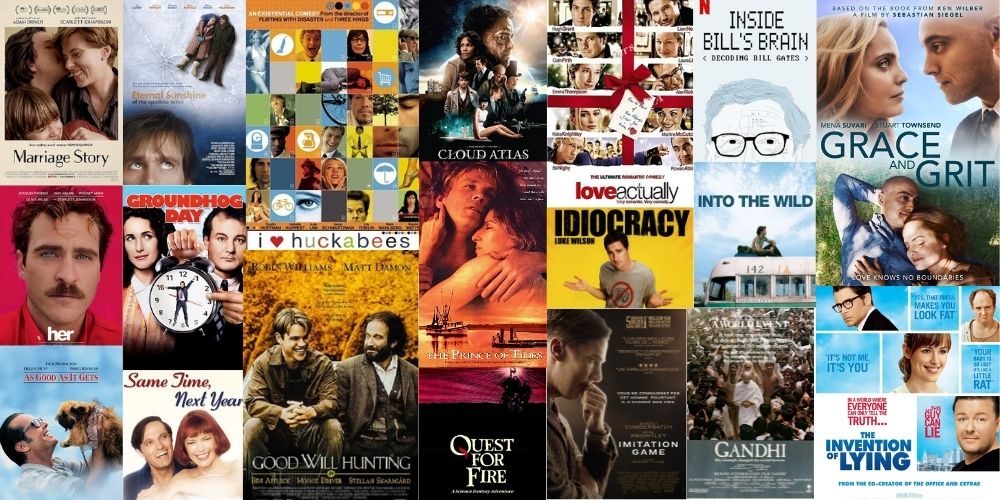
Below are movies that depict each of the 26 IR Training Modules.
In the Movies we see characters with various perspectives (Quadrants) at certain levels of development in various developmental lines with different polarities. Some depict characters at different levels clashing with each other, some show characters transforming from one level to the next over a longer period of time (e.g. “Groundhog Day”, “7 Years in Tibet”, “Marriage Story”). You may also recognize if characters do better integration by becoming healthier at their level, e.g. Jack Nicholson in “As Good As It Gets”, or if they truly go through a transformation which usually takes many years.
If you have additional movie suggestions, please share them with me in the format below (and say why you suggest them). If you only watch two Movies I suggest “Cloud Atlas” (also a great book) and “American Beauty”.
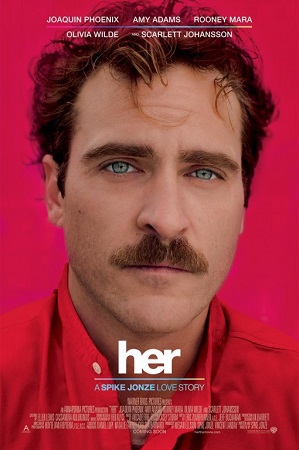
Module 1 – Her (2013)
The four dimensions of relating
Watch this Oscar-winning movie for best screenplay to see that healthy love relationships can only flourish if they are co-created and balanced and harmonized in all four dimensions of being and relating between opposite and equal partners.
The main protagonist, Theodore (Joaquin Phoenix), is a heartbroken, sensitive, and soulful man who lives in a not-so-distant future, where he earns a living by writing personal letters for other people. His recently ended marriage seems to have mostly focused on the right-hand exterior quadrants.
Ten minutes into the movie, he sees an advertisement that poses a few “simple questions”: “Who are you? What can you be? Where are you going? What’s out there? What are the possibilities?” The ad is for ”OS1,” a new intuitive and conscious artificially intelligent operating system that promises to listen to him, understand him, and to know him. Theodore is intrigued.
After installing OS1 and answering a few personal questions, he is introduced to “Samantha” (Scarlett Johansson), a computer-generated voice that reveals a sensitive and playful personality. Though “friends” initially, they soon develop a deeper connection. As their relationship in the left-hand interior dimensions deepens, Theodore falls in love with Samantha, who becomes increasingly emotionally intelligent and “conscious” through their connection, but also more challenging, as it is often the case in real-life relationships. Despite their best efforts to extend their relationship into the right-hand exterior dimensions, and Theodor’s efforts to keep up with her evolving consciousness and emotional complexity, they increasingly struggle, and she (spoiler alert!!!!) eventually exceeds his level of development and breaks up with him.
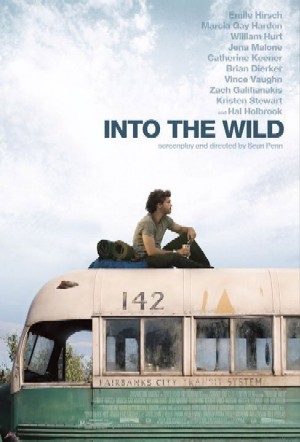
Module 2 – Into the Wild (2007)
Survival, magic, and power in love relationships
Watch this movie that is based on the true story of Christopher McCandless, aka “Alexander Supertramp” (Emile Hirsch), written by Jon Krakauer and directed by Sean Penn, to see an idealistic, rebellious, complex young man who grew up in a dysfunctional family regress to a Red egocentric, Purple/Infrared magic, and finally Beige/Infrared archaic stage of pure survival.
After graduating from Emory University, where he was a top student and athlete, McCandless abandons his possessions, gives his entire $24,000 in savings to charity, and eventually hitchhikes to Alaska to “live off the land” in the wilderness, where he eventually perishes.
Along the way, McCandless encounters a series of characters at different levels of first-tier consciousness development who shape his perspectives on life.
His final entry into his journal is a motto for Integral Relationships: “Happiness is only real when shared.”
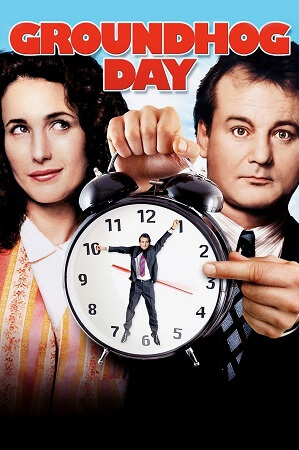
Module 3 – Groundhog Day (1993)
Mythic conformism and modern rationality in love relationships
Watch this now classic movie to see Phil Connors (Bill Murray) evolve from the egocentric to the mythic level of consciousness development to win the heart of Rita (Andie MacDowell).
Connors is a cynical egocentric television weatherman who is sent to Punxsutawney, PA, for the fourth time in as many years to cover the story of a weather-forecasting groundhog. There, he becomes trapped in a time loop, forcing him to relive February 2 again and again.
He first uses his “power” to take advantage of others and to do whatever brings him pleasure, as any egocentric person would do, and even believes himself to be godlike.
When he realizes that he is stuck in this time loop forever and no longer finds fulfillment, he tries to kill himself, an act that we can see as a metaphor of the necessary “ego death” before a new stage can emerge. As so often happens in real life, he realizes that if he wants to win Rita’s heart and entice her to spend the night with him, he needs to meet her expectations by becoming a better man. He does this through transforming to the next higher Blue/Amber mythic level of consciousness development, which seemingly takes a few years, by cultivating his natural talents for creating more goodness and beauty in service of his community.
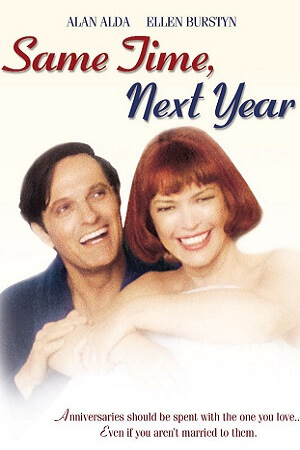
Module 4 – Same Time, Next Year (1978)
Postmodern pluralistic sensitivity in love relationships
Watch this movie to see the two main characters, Doris (Ellen Burstyn) and George (Alan Alda), evolve from the Red egocentric to the Blue/Amber mythic, Orange rational, and eventually Green Pluralistic stages of consciousness development over the time span of 26 years, from 1951 to 1977.
George and Doris meet by chance over dinner at a romantic Northern California inn. Although both are married to others, they find themselves in the same bed the next morning, questioning how this could have happened. Regardless, they agree to return on the same weekend each year to continue their affair.
Originally a stage play by Bernard Slade, the movie follows the two characters as they are seen changing in different scenes, five years apart, always in the same room. As time goes on, each is helped through a transformative personal crisis by the other, often without either of them understanding what is going on.
As their values and concerns noticeably change with every encounter that we witness, we also see feminine-masculine polarity reversal between them in the Green pluralistic stage, which we will explore in Module 11, on page 183
https://www.imdb.com/title/tt0078199/
https://www.youtube.com/watch?v=G3U2LbkkkPM

Module 5 – American Beauty (1999)
Integral and transpersonal love relationships
Watch this truly Integral movie to see how people at different levels of consciousness development collide with each other in their daily lives. On the surface, the movie is about the breakdown and disintegration of a middle-class American family. On a deeper level, we painfully see how people at five different levels of consciousness development (archaic, magic, egocentric, mythic, rational, and pluralistic), with their divergent values, concerns, needs and worldviews, get into irresolvable conflicts with each other, and how an integral person critically reflects and engages with them all. At the end of the movie, we even offered a glimpse into the transpersonal stage.
Lester Burnham (Kevin Spacey) is the husband of real estate agent Carolyn Burnham (Annette Bening) and father to high school student Janie Burnham (Thora Birch). Although Lester and Carolyn were once in love, they now merely tolerate each other. Typical “Red/egocentric” wallflower Janie hates both of her parents. “Orange/rational” Carolyn wants to create the persona of success to further her career in real estate. Initially “Orange/rational” Lester walks mindlessly through life, including at his job in advertising, until he falls in love at first sight with Janie’s “Purple/Magenta/magic” classmate, Angela Hays (Mena Suvari). His infatuation “transforms” Lester into the “Green/Pluralistic” stage—with plenty of the pre/trans fallacy—where he no longer cares what anyone thinks about him (except for Angela). When homophobic disciplinarian, “Blue/Amber mythic” Marine Colonel Frank Fitts (Chris Cooper), his demented “Beige/Infrared/archaic” wife, Barbara Fitts (Allison Janney), and their seemingly “Teal/Yellow/integral” eighteen-year-old son, Ricky Fitts (Wes Bentley) move in next door, the drama unfolds, and eventually all of the players are forced to confront their demons.
https://www.imdb.com/title/tt0169547/?ref_=nv_sr_srsg_0
https://www.youtube.com/watch?v=Ly7rq5EsTC8
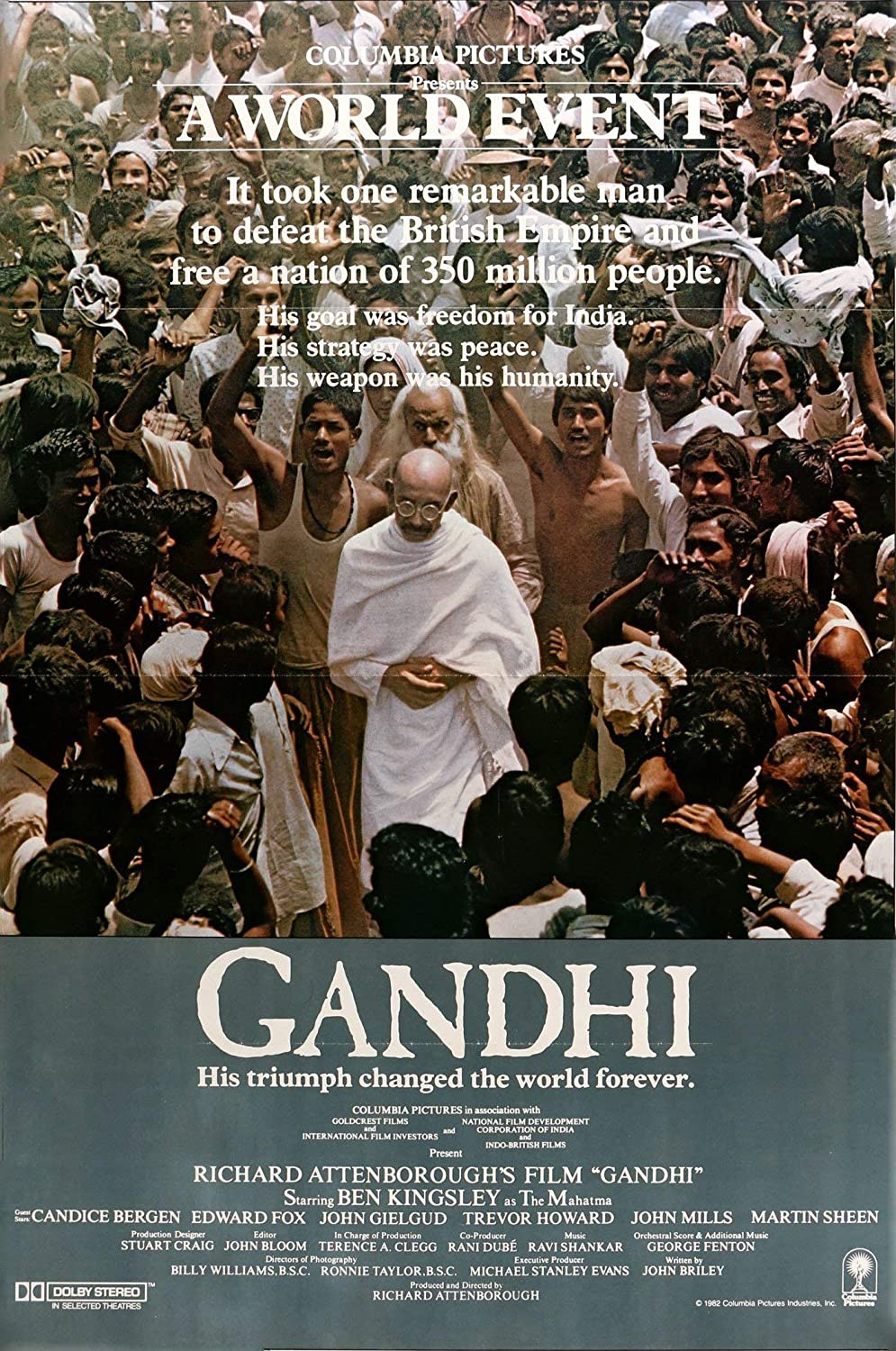
Module 6 – Gandhi (1982)
Compassionate communication
Watch this profound multiple Oscar-winning movie to see how Mahatma Gandhi (Ben Kingsley) became the famed father of the modern nonviolence movement and Green icon through his leadership of the Indian revolts against the British rule and his philosophy of nonviolent protest.
In 1893, Gandhi, who has just become a UK-trained lawyer, is thrown off a South African train for being an Indian and traveling in first class. He realizes that the laws are biased against Indians and decides to start a nonviolent protest campaign. After numerous arrests, the government finally relents by recognizing rights for Indians. After this victory, Gandhi is invited back to India and urged to take up the fight for India’s independence from the British Empire. Gandhi agrees and mounts a nonviolent non-cooperation campaign of unprecedented scale, coordinating millions of Indians nationwide. The campaign generates great attention, and Britain finally grants India’s independence. Religious tensions between Hindus and Muslims erupt into nationwide violence. Gandhi declares a hunger strike and the fighting eventually stops, but the country becomes divided into today’s predominantly Hindu India, and Muslim-majority Pakistan and Bangladesh. Gandhi opposes the idea, but the partition of India is carried out, nevertheless. Gandhi spends his last days trying to bring about peace between both nations and thereby angers dissidents on both sides, one of whom finally gets close enough to assassinate him.
https://www.imdb.com/title/tt0083987/
https://www.youtube.com/watch?v=B7I6D3mSYTE
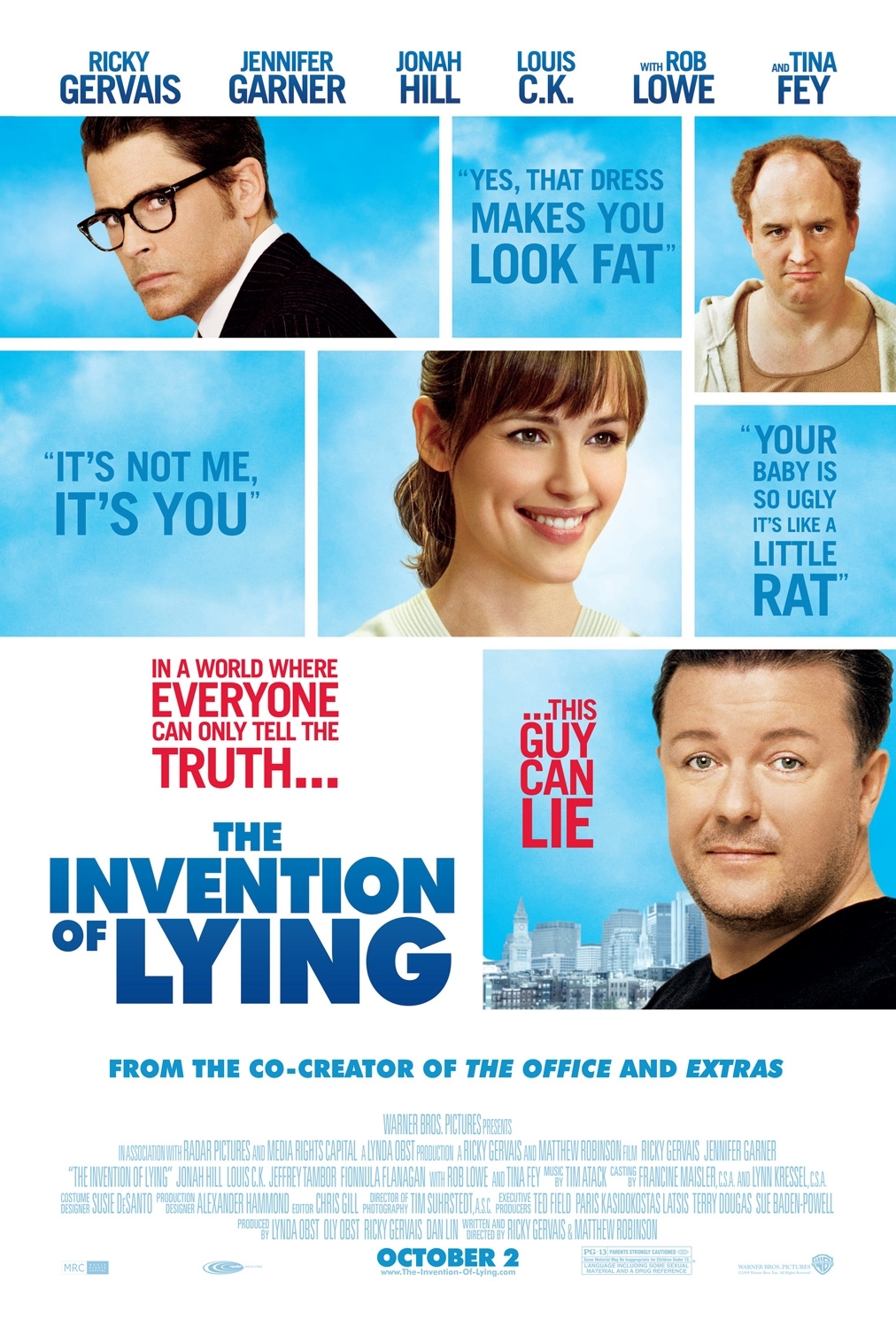
Module 7 – The Invention of Lying (2009)
Need-Based communication
Watch this at times silly but nonetheless provocative movie to discern and discuss concepts such as belief, knowing, truth, honesty, truthfulness, rightness, validity, communicating, understanding, agreeing, and intimacy (in-to-me-you-see), and the opposing concepts of untruths, lies, deceptions, etc., at different levels of consciousness development, and how all of these concepts impact our love relationships. This star-studded semi-romantic comedy also touches on subjects such as the primary sexual fantasies, which we will cover in Module 9, and religion, which we will touch on in Module 12.
Mark Bellison (Ricky Gervais) is a physically unappealing unsuccessful screenwriter who lives in a world that has no concept of untruth. As his life moves further and further into despair, he stumbles across the concept of lying. Everyone believes whatever he says, and he becomes successful, rich, and famous. But he can’t get the one thing he really wants—the love of Anna McDoogles (Jennifer Garner), a beautiful woman who is generally out of his league—because he does not match her primary sexual fantasy of a physically attractive person. In a crucial moment when Mark could have lied to Anna to win her over, he tells the truth, and Anna finally realizes that she loves him.
After watching the movie, you may explore the following:
- What would happen if we always truthfully shared what we think and feel, and never lied? What happens if we truly believe things that are not true?
- What is truth and how can we know it?
- Why do people believe different things to be true?
- Why do we lie?
- Are white lies okay?
- Does lying ever serve a purpose, such as being kind or not hurting others?
- Do we really want others to be totally honest?
- Is radical honesty the best way to go through life and create a better world?
- Should we only say what is true, truthful, kind, and necessary?
https://www.imdb.com/title/tt1058017
https://www.youtube.com/watch?v=RhRnmyBjOLs
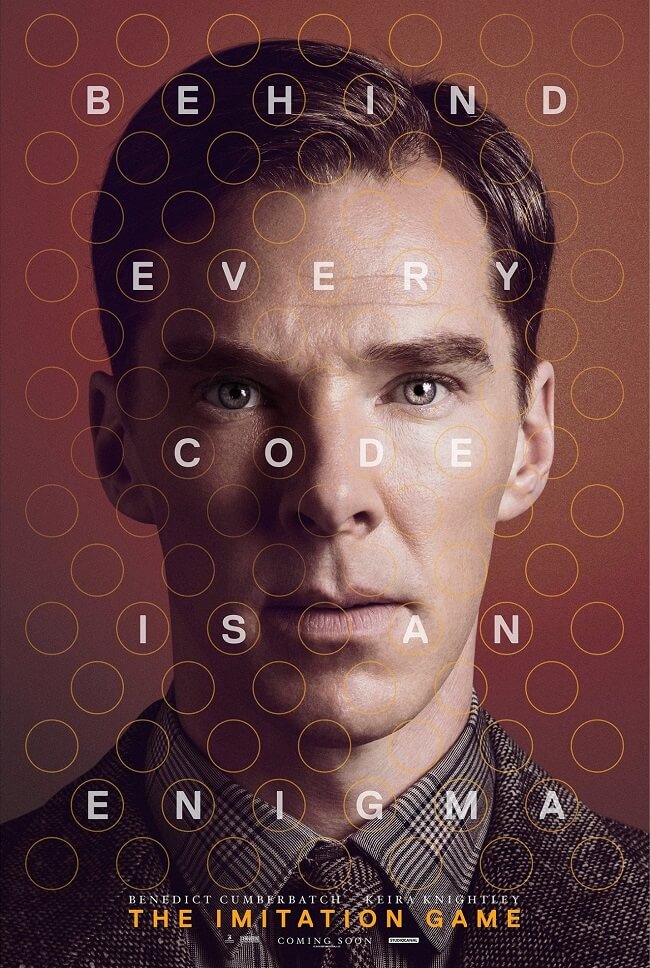
Module 8 – The Imitation Game (2014)
Integral and transpersonal communication
Watch this movie to see the complexity of communication, including implicit and explicit language, advancements into novelty, artificial intelligence, and codes.
Loosely based on true events, the movie focuses on Alan Turing (Benedict Cumberbatch), who is hired in 1939 to crack Nazi codes—including Enigma, which was thought unbreakable. With help from fellow mathematicians and linguists, including Joan Clarke (Keira Knightley), he builds what later became called “a computer.” He was inspired by a friend who told him earlier in his life that sometimes it is the people no one imagines anything of who do the things that no one can imagine.
Historians estimate that breaking Enigma shortened WWII by more than two years, saving over fourteen million lives. Turing’s work inspired generations of research into what scientists called “Turing machines,” now known as computers.
Turing also proposed an experiment that became known as the Turing test, an attempt to define a standard by which a machine can be defined as “intelligent.” He postulated that a computer could be said to “think” if a human interrogator could not distinguish it from a human being through conversation.
The quiet genius encountered disgrace in 1952, when UK authorities revealed that he was gay, and it is speculated that Turing killed himself in 1954, after a year of debilitating government-mandated hormonal therapy as an alternative to being sent to prison.
https://en.wikipedia.org/wiki/Alan_Turing
https://www.imdb.com/title/tt2084970/
https://www.youtube.com/watch?v=nuPZUUED5uk
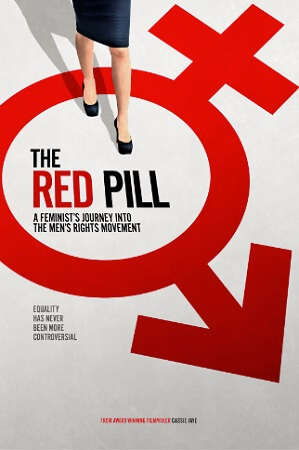
Module 9 – The Red Pill (2016)
Biological Differences and Learned Gender Roles
Watch this movie to see the journey of feminist filmmaker Cassie Jaye from San Anselmo, CA, as she explores today’s gender wars and asks the question: “What is the future of gender equality?” She interviews radical feminists and leaders of the mysterious and polarizing Men’s Rights Movement (MRM), among them the intellectual godfather of the movement, Warren Farrell, author of the The Myth of Male Power: Why Men are the Disposable Sex.
As an illustration of male powerlessness, MRM members point out that men are the only sex drafted to fight wars; to traditionally take on high-risk jobs in mining, agriculture, forestry, and fishing; are 11 times more likely than women to die on the job; have much higher suicide rates; and are three times more likely than women to be murder victims. Moreover, women live five years longer on average than men. MRM members also argue that fathers’ rights are legally secondary to mothers’ rights in family court and child custody cases, and although death rates for breast cancer and prostate cancer are about the same, six times more money is spent on breast cancer research in the U.S.
The male and female feminists in the movie counterargue that these arguments all come from whiny men who still hold all the power and that “nobody believes that what they say is true,” so they should just shut up.[i]
https://www.imdb.com/title/tt3686998/
For a detailed article see: https://www.mercurynews.com/2016/11/08/bay-area-filmmakers-new-film-the-red-pill-is-a-bitter-one-for-feminists-to-swallow/
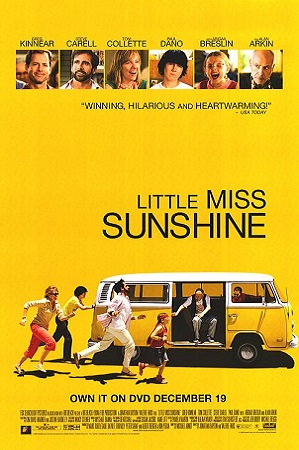
Module 10 – Little Miss Sunshine (2006)
Avoiding the Fear – Shame Downward Spiral
Watch this hilarious and touching movie to see elements of the fear-shame downward spiral. On one hand, this is a very funny comedy. On the other hand, it painfully shows the shame of males about failing professionally, and the fears of the two female characters around their safety and not being beautiful enough.
The plot revolves around a somewhat dysfunctional multigeneration family that is determined to get their youngest member Olive Hoover (Abigail Breslin) to the finals of the “Little Miss Sunshine” beauty pageant. Father Richard (Greg Kinnear), his wife, Sheryl (Toni Collette), her gay brother, Frank (Steve Carell), her Nietzsche-admiring son, Dwayne (Paul Dano), and Richard’s grandfather, Edwin (Alan Arkin) embark on the 800-mile (1300 km) trip in their ailing yellow VW bus, traveling from Albuquerque, New Mexico, to Redondo Beach, California. On the way, they must overcome several obstacles and challenges that bring them closer together.
https://www.imdb.com/title/tt0449059/
https://www.youtube.com/watch?v=wvwVkllXT80
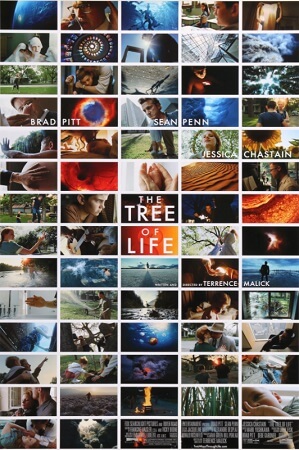
Module 11 – The Tree Of Life (2011)
Feminine-Masculine Polarities
Watch this profound and complex movie to see the masculine ascending and agency, and feminine descending and communion interacting at all levels of the evolutionary process, including our human life and death.
The Tree of Life is both an experimental film and an epic drama, written and directed by American filmmaker Terrence Malick. In it we see the main character, Jack (Sean Penn), looking back at his childhood in a 1950s Texas family where he is conflicted between the way of grace, as embodied by his demurring feminine mother (Jessica Chastain), and that of nature, as embodied by his patriarchal masculine father (Brad Pitt). Also see the formation of his anima complex (Module 14) and the tensions between the archaic, magic, egocentric, mythic, and rational stages of the characters.
The movie is interspersed with imagery and sounds of the origins of the known universe and the inception of life on Earth and features amazing music.
https://www.imdb.com/title/tt0478304/?ref_=nv_sr_srsg_0
https://www.youtube.com/watch?v=RrAz1YLh8nY
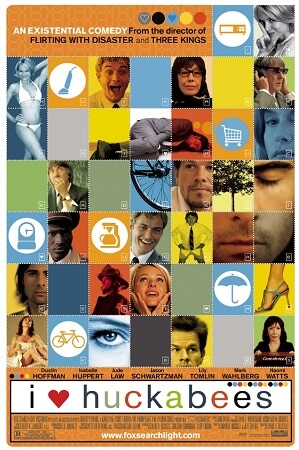
Module 12 – I Heart Huckabees (2004)
Spiritual Development
Watch this chaotic, funny, and thought-provoking spiritual/philosophical comedy to see elements of desire, attachment, delusions, and hatred at the gross, subtle, causal, and pure witness level of spiritual development come into paradoxical conflicts with each other.
The plot follows “existential” detectives Bernard Jaffe (Dustin Hoffman) and his wife, Vivian (Lily Tomlin), who are hired to investigate certain events and the possible underlying meanings in the lives of their clients Albert Markovski (Jason Schwartzman), Tommy Corn (Mark Wahlberg), Brad Stand (Jude Law), and Dawn Campbell (Naomi Watts). Vivian and Bernard are of the general Buddhist view that everything is connected and has meaning, and that our ego and unconscious separates us from this realization, thus creating suffering.
As the different investigations cross paths and chaos ensues, their former student and now rival and nemesis, Caterine Vauban (Isabelle Huppert), enters the scene. She drags Albert and Tommy into her nihilistic and cynical view that life is nothing but cruelty, manipulation, meaninglessness, and suffering that cannot be escaped and so is best endured by being present in the now and surrendering to what is—which leads to pure being (reminiscent of Eckhart Tolle).
At the end of the movie, the potential of a synthesis between the two opposing views emerges.
https://www.imdb.com/title/tt0356721/
https://www.youtube.com/watch?v=2eOLOmCjRPY
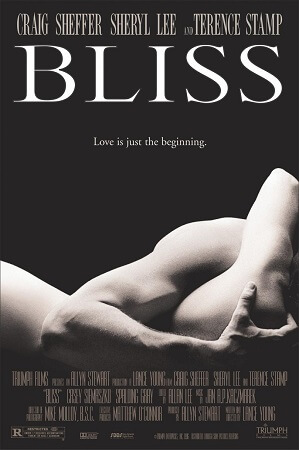
Module 13 – Bliss (1997)
Sexual Development
Watch this movie to see many elements that we explored in the previous modules and that we will address as we move forward, including the four dimensions of being and relating, levels of consciousness development, sex and gender, fear-shame downward spiral, feminine-masculine polarities, spiritual and sexual development, tantra, developmental trauma, anima/animus complex, personality types, personality disorders, psychological healing, and the seven chakras. At times, it may feel that the script was just written for us.
Bliss is a deeply emotional movie that tells the story of a couple who are in love but have many challenges, especially with their sex life. Within six months, they’re telling their problems to the therapist, Alfred (Spalding Gray), who uses a traditional psychoanalytic approach. In addition, the wife, Maria (Sheryl Lee), is sneaking to secret sessions with a sex therapist named Baltazar (Terence Stamp), who “operates on the edge of the law” to heal sexual trauma. (Disclaimer: If you have experienced sexual trauma and feel vulnerable, this movie may be disturbing to watch.) Soon after, her husband, Joseph (Craig Sheffer), finds out. After an initial hostility towards Baltazar that discloses that Joseph is better than his wife at hiding his anger and other vulnerable feelings (go figure), Joseph also becomes Baltazar’s client to learn about sex as bliss, which is nine on Baltazar’s erotic scale and far above simple orgasm, which is around level four on the scale. Eventually, the two therapists meet and gain important information that validates each of their approaches, as Maria and Joseph heal and deepen their relationship.
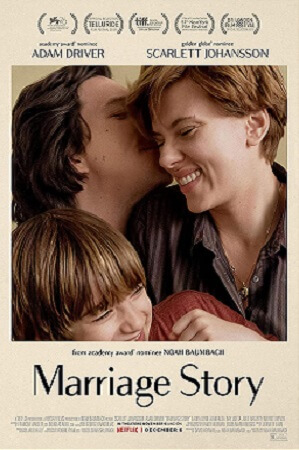
Module 14 – Marriage Story (2019)
Anima Animus Complex Development
Watch this Oscar-nominated Netflix movie to see the story of a painful divorce between the New York-based theater director, Charlie Barber (Adam Driver), who is stuck in stage three of his anima complex development, and his wife, Nicole Barber (Scarlett Johansson), an actress originally from Los Angeles, who moved into stage four of her animus complex.
Charlie is especially clueless about the needs of his wife and the dynamic that is slowly and painfully unfolding between them, since for him everything seems to be fine in their life and marriage, as is typical for men in this stage. He simply can’t understand why she needs to claim her female authority by finding her own independent identity. The movie’s conclusion offers a glimpse that Charlie has moved into his anima complex stage four and has come to peace with their separation.
This movie couldn’t be more perfect to illustrate the anima/animus stage three and four dynamic between a couple; it’s a must-see for everyone who is in such a situation or wants to understand it better.
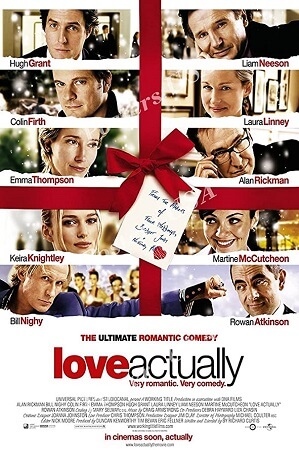
Module 15 – Love Actually (2003)
Love Languages
Watch this classic British romantic comedy to see the different Love Languages and, as a preview for the following Module 16, Nine Enneagram types play out, as you follow eight very different couples in dealing with their love lives in various loosely interrelated tales, all set during a frantic month before Christmas in modern London.
While this star-studded movie (Alan Rickman as Harry; Emma Thompson as Karen; Hugh Grant as David, the Prime Minister; Keira Knightley as Juliet; Colin Firth as Jamie; Liam Neeson as Daniel; Bill Nighy as Billy Mack; Martine McCutcheon as Natalie; Laura Linney as Sarah; Martin Freeman as John; Olivia Olson as Joanna; Billy Bob Thornton as the US President; Claudia Schiffer as Carol) can be fun to watch, it also painfully shows the misguided shallow notion that all it takes to enter a happy love relationship is to muster up the courage to say; “I love you.”
As in He’s Just Not That Into You and similar movies, the protagonists have nothing visibly in common, such as shared values, interests, or passions, beyond having a (hormonal) crush on each other and being at a more or less rational stage of development.
Other things that we may critically notice from today’s perspective are the objectification of women; sexist references to the characters’ weight; suggestions and attempts to repress feelings, especially in males, so as not to be seen as weak; the strange “relationship” between Peter and his best friend’s new wife; and a not-so-subtle anti-Americanism.
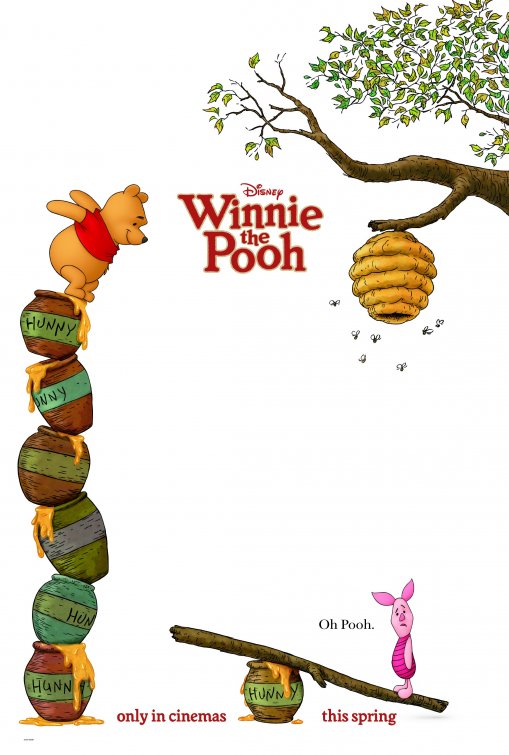
Module 16 – Winnie the Pooh (2011)
Enneagram Types
Watch this and other movies from Disney’s Winnie the Pooh series (Disney-Buena Vista Home Videos) or read the books to see that most of the Pooh characters clearly fit one of the nine different Enneagram styles, which is one of the reasons these stories are both charming and memorable. Here is the list of characters and their corresponding Enneagram types:
-
- The Reformer: Rabbit
- The Helper: Kanga (mother of Roo)
- The Achiever: Gopher *
- The Individualist: Eeyore
- The Investigator: Owl
- The Loyalist: Piglet
- The Enthusiast: Tigger
- The Challenger: Gorilla *
- The Mediator: Pooh
* Not in the Movie
While searching for honey, Pooh and his friends embark on an adventure to find Eeyore’s missing tail and rescue Christopher Robin from an unknown monster called The Backson.
Trailer:
https://www.youtube.com/watch?v=atDrd8WQeqcThe Enneagram According to Pooh:
https://theenneagraminbusiness.com/fascinating-or-fun/the-enneagram-according-to-pooh/The Enneagram in the Movies (and a little TV):
https://foldedandunfolding.wordpress.com/2016/01/11/the-enneagram-in-the-movies-and-a-little-tv/Other Enneagram Movies:
https://enneagrammaine.com/the-movie-list/
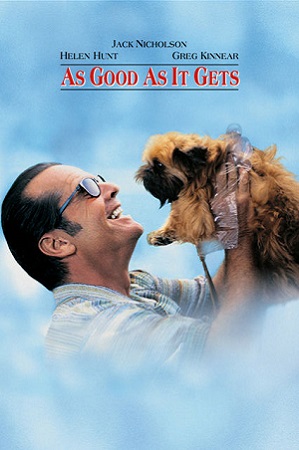
Module 17 – As Good As It Gets (1997)
Attachment Styles
Watch this movie to see the misanthropic, obsessive-compulsive, egocentric, cynical, and manipulative best-selling romance novelist, Melvin Udall (Jack Nicholson), as he struggles with his anxious-avoiding attachment style after he falls in love with the waitress Carol Connelly (Helen Hunt), who displays an avoidant attachment style (or healthy boundaries, depending on your view).
After his neighbor, the sensitive gay artist Simon Bishop (Greg Kinnear), is assaulted and nearly killed during a robbery in his New York apartment, Melvin is forced to take care of Simon’s dog, Verdell, to whom he becomes emotionally attached. This softens his relationship with Carol. Melvin’s life is turned upside down when Carol leaves her job to care for her acutely asthmatic son, Spencer (Jesse James). To reconnect with her, Melvin hires a doctor to take care of her son and invites Carol to go on a road-trip with him and Simon, who is by now broke and needs to ask his parents for money. At dinner with Carol during the trip, Melvin lets down his guard and confesses to her, “You make me want to be a better man”—only to ruin the romantic moment a minute later when he suggests that Carol should have sex with Simon to help him “get over” his gayness. After returning to New York, Carol tells Melvin that she does not want him in her life anymore but later regrets her statement and calls to apologize. After Melvin is persuaded by Simon to meet Carol in the middle of the night and declare his love for her, Carol hesitantly agrees to establish a relationship with him.
https://www.imdb.com/title/tt0119822/
https://youtu.be/rrRl2QQKkI8
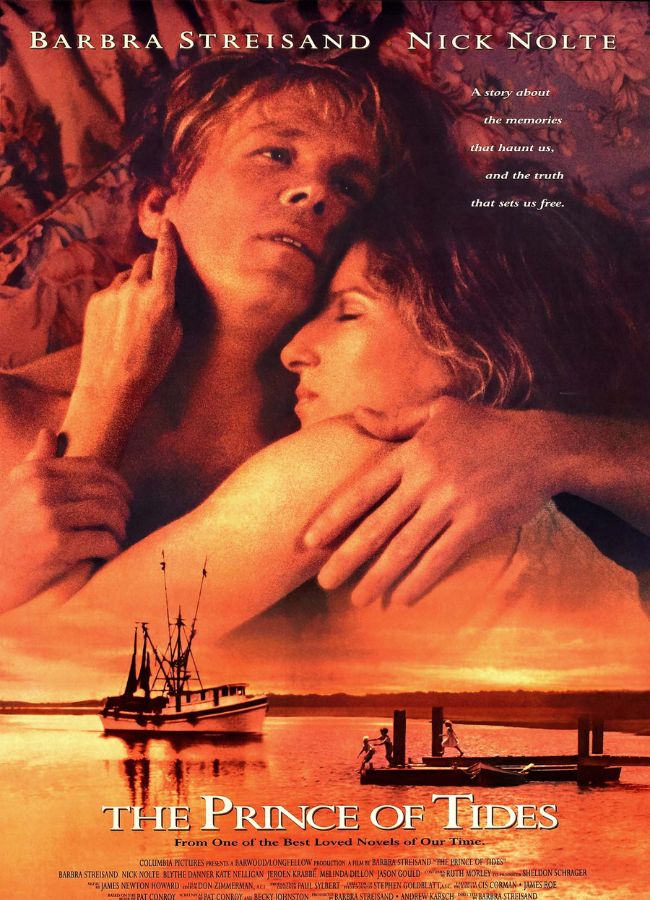
Module 18 – The Prince of Tides (1991)
The Unconscious
Watch this movie to see how the effects of childhood trauma and the repression of related memories and emotions negatively impact our ability to feel fully alive, to live on purpose, and to form healthy love relationships.
The film stars its director, Barbra Streisand, as New York psychiatrist Dr. Susan Lowenstein. She treats the emotionally scarred Sallie Wingo (Blythe Danner), a woman who tried to commit suicide. To solve the mysteries of her troubled client’s past, Lowenstein asks Sallie’s twin brother, Tom (Nick Nolte), an unemployed, aimless, and miserable football coach, to come to New York from South Carolina, where he lives in a strained relationship with his wife and daughters. As Lowenstein and Tom work together and fall in love, deep hidden secrets are revealed and healing takes place that transforms them to find new meaning in their life.
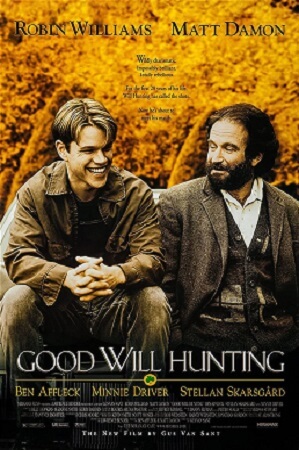
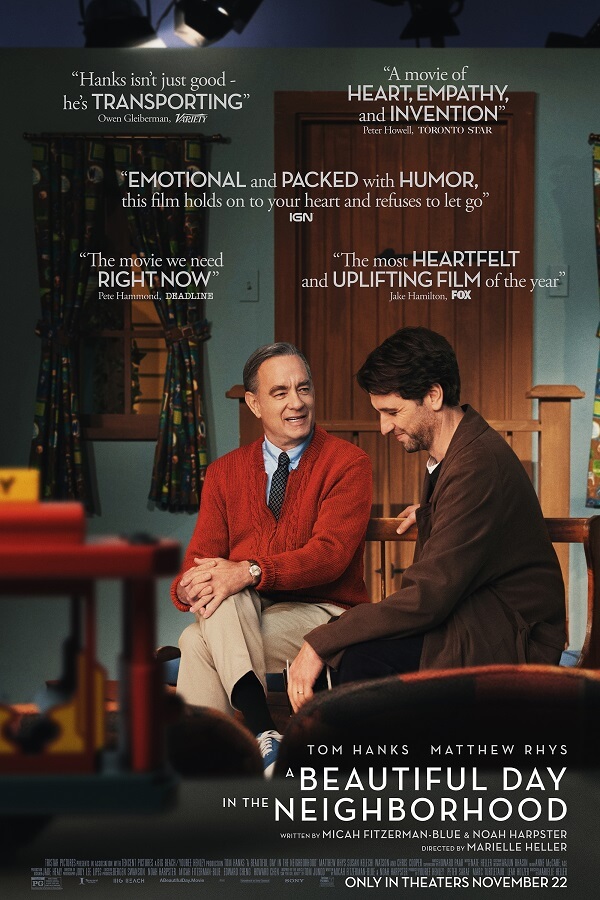
Module 19 – Good Will Hunting (1997)
Healing our Shadow
Watch this amazing movie, written by Ben Affleck and Matt Damon in their twenties, to see that knowledge without experience is blind, and to see how unresolved trauma limits our ability for empathy, intimacy, love relationships, and living on purpose.
The young immature genius Will Hunting (Matt Damon) lives in a small world in South Boston, where he can seemingly solve any problem with his mind but lacks any real-life experiences outside of his bubble.
After getting into trouble with the law again, Will is assigned to therapist Dr. Sean Maguire (Robin Williams), who tries to help him with his anger and emotional dissociation issues. Will further struggles with his unconscious daemons and avoidant attachment style after he falls in love Skylar (Minnie Driver), a Harvard student who plans on attending medical school at Stanford after she graduates. As Sean struggles with Will in their weekly sessions and finally breaks through to him, he is also transformed, and both break free and embark on a new life.
Module 19 – A Beautiful Day in the Neighborhood (2019)
Healing our Shadow
Watch “A Beautiful Day in the Neighborhood” to see a great example of healing complex childhood developmental trauma that fits perfectly with our shadow Module 19 and the NARM Method.*
Based on the true story of a real-life friendship between Mr. Fred Rogers (Tom Hanks) a beloved American television host of children’s programs about kindness and emotional intelligence and journalist Lloyd Vogel (Matthew Rhys), a jaded cynical magazine writer with deep childhood wounds caused by a troubled relationship with his father Jerry (Chris Cooper).
After Lloyd is assigned to write an article about Mr. Rogers and gets to know him, he slowly and reluctantly overcomes his skepticism and cynicism as he learns about empathy, kindness, and decency. Eventually he gets in touch with his vulnerable feelings that are protected by his primary default emotional reactions of anger and fear. This allows him to heal his childhood wounds by getting in touch with what he really wants (connection with others), embrace his grief and sadness, connect with his late mother, and make peace with his father and himself through forgiveness.
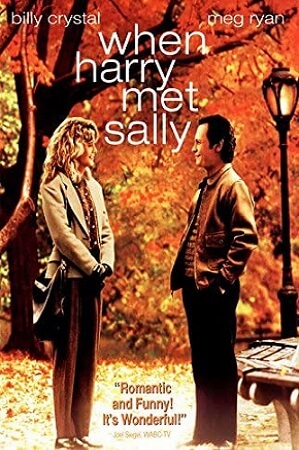
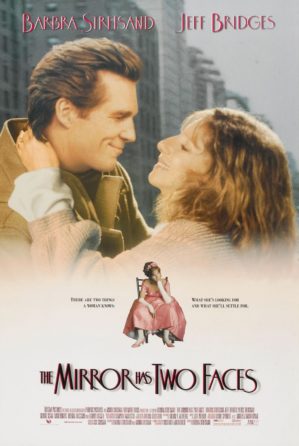
Module 20 – When Harry Met Sally (1989)
Forms, Levels, and States of Love
Watch this beautiful, intelligent, touching, and revealing romantic comedy to see the multiple phases of love—from lust to infatuation, romance, conflict, commitment—and breakups, as the dynamics between emotional intimacy, sexual passion, and unconscious dependence unfold in the relationships of the couples who are portrayed.
At the center of the movie are the love lives of Harry Burns (Billy Crystal) and Sally Albright (Meg Ryan), who meet for a drive from Chicago to New York after they graduate from college. During their road trip, they argue about whether men and women can ever truly be strictly platonic friends. Ten years later, they meet again by chance and agree to form a friendship without having sex with each other, to avoid this complication between them. Their resolve is increasingly challenged, as their friendship deepens while they date other people and support each other with the challenges in their separate love lives.
The Mirror Has Two Faces (1996)
Watch this touching and witty comedy, directed by Barbra Streisand, to see the various phases, states and forms of love that are experienced through various levels of emotional intimacy, sexual passion, and unconscious dependence.
Rose Morgan (Barbara Streisand) is a plain, plump English literature professor who feels that she can’t compete with her gorgeous mother and sister. Gregory Larkin (Jeff Bridges) is a math professor who believes that sexual passion has ruined his life. The two Columbia University professors meet through a “personals” ad (this was before internet dating). After their intellectual friendship deepens, they decide to form a marriage that is solely based on intimacy and commitment (the left and bottom side of the triangle), while repressing any sexual passion (the right side of the triangle). This strategy only works until Rose develops more of her feminine side and, with the help of her mother, heals her childhood insecurities around her looks. Their marriage is nearly destroyed when Rose, to Gregory’s shock, tries to consummate their relationship. While Gregory is in Europe on a lecture tour, Rose transforms herself into a sexy siren to integrate the passion side of the triangle to save her marriage.
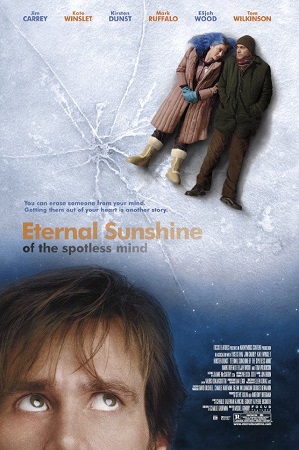
Module 21 – Eternal Sunshine of the Spotless Mind (2004)
Personality Disorders
Watch this movie to see the relationship between a needy, insecure empath with weak boundaries and a woman who has a borderline personality disorder descend through the 22 stages of decline.
After an impulsive decision to go to Montauk, introverted, and anxious Joel Barish (Jim Carrey) meets the free-spirited, impulsive, and unhinged Clementine Kruczynski (Kate Winslet) on the train home. She displays multiple symptoms of a borderline personality disorder and seduces him—a typical first step in such relationships—and he falls in love with her. As the movie jumps back and forth between different times of their relationship and Joel’s childhood, we see more of the psychological issues that afflict them both.
At one point, Joel discovers that Clementine had broken up with him and had her memories of him erased from her brain by a firm called Lacuna. Heartbroken, Joel decides to undergo the same procedure, erasing her from his memory, as well, after he records a tape about his experience with her. Despite later hearing this tape, he becomes entangled with her again, seemingly having nothing learned from the breakup, a pattern which is emblematic of people with weak boundaries.
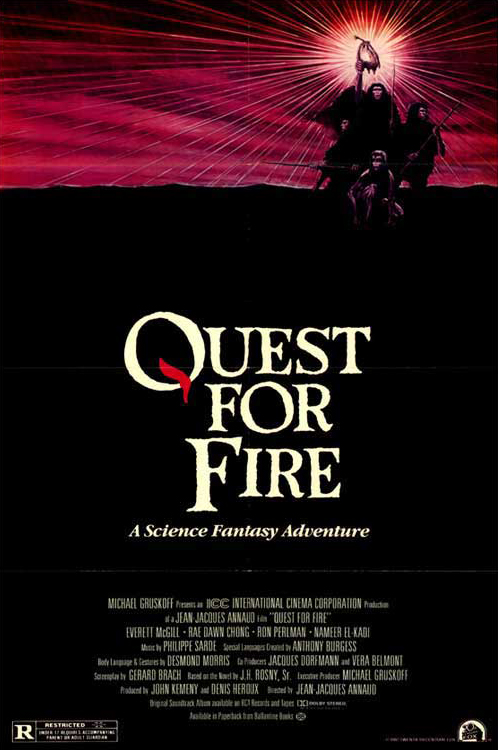
Module 22 – Quest for Fire (1981)
Sharing your Biological Purpose
Watch this movie to gain a deeper understanding of our evolutionary biological differences and purpose, and our capacity to love along the seven chakras.
The movie takes place in prehistoric times, as three tribesmen search for a new source of fire and, on the way, one of them also finds a mate. The new couple grows closer through intimate touches and glances, and a sense of deeper affection forms. As their relationship evolves, so too do her emotions and sexuality. At one point, she softly turns and lies on her back, and the invitation is clear but confusing for her partner. Face-to-face lovemaking is unheard of, and he is unsure of what to do. But she guides him and holds him, and soon he is upon her, looking in her eyes. We see, in one sensual and emotional moment, the shift from animal copulation to human lovemaking. It is a simple moment, but powerful in its presentation and what it means for human evolution, reminiscent of Geoffrey Miller’s book, The Mating Mind, and Ferdinand Fellman’s book, The Couple, in which the authors convincingly argue that human evolution in consciousness was caused through the intimate pair bond and face-to-face sexuality.
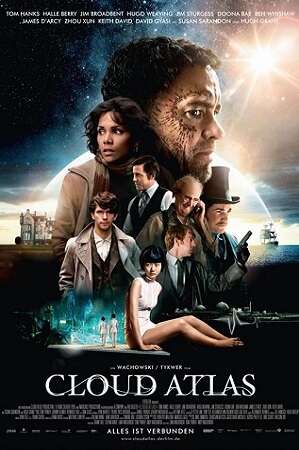
Module 23 – Cloud Atlas (2012)
Transcendental Purpose
Watch this truly amazing, must-see epic science fiction movie, written and directed by the trans women Lana and Lilly Wachowski (who also created The Matrix) and Tom Tykwer, and based on the 2004 novel by David Mitchell. In the film, we see that living our transcendental purpose of creating more goodness, truth, beauty, and functionality in the context of healthy love relationships matters for creating a better world and future for humanity.
The movie moves in six different time periods, from 1849 to 2321. The main actors change gender and race throughout the movie, and some move from evil to neutral to good (and back). The main protagonists in each epoch are connected through their deeds, souls, or reincarnations, as indicated by their birthmarks. What makes the movie interesting and challenging to watch is that it jumps between the six time periods every few minutes to show the parallels of three main phases: enslavement, epic battles, and liberation. Watch the movie through the lens of stages of consciousness development and transformations between these stages from archaic to transpersonal. Notice the good, true, beautiful, and functional that is created by the “good” (heroic) characters through their words and deeds as they battle the “evil” villains. See how the positive actions of the soulmates ripple through the centuries. To quote Sonmi-451:
Our lives are not our own. From womb to tomb, we are bound to others, past and present, and by each crime and every kindness, we birth our future. To be is to be perceived, and so to know thyself is only possible through the eyes of the other. The nature of our immortal lives is in the consequences of our words and deeds, that go on and are pushing themselves throughout all time.”
In a more subtle way, you may also notice that Robert Frobisher’s Cloud Atlas composition will be heard as an (1) initial piano performance, (2) a symphony, (3) a rendition by a jazz sextet, (4) nursing-home Muzak, (5) futuristic Korean street music, (6) a solemn hymn sung by a hoard of clones.
https://www.imdb.com/title/tt1371111/?ref_=ttfc_fc_tt
https://www.youtube.com/watch?v=hWnAqFyaQ5s
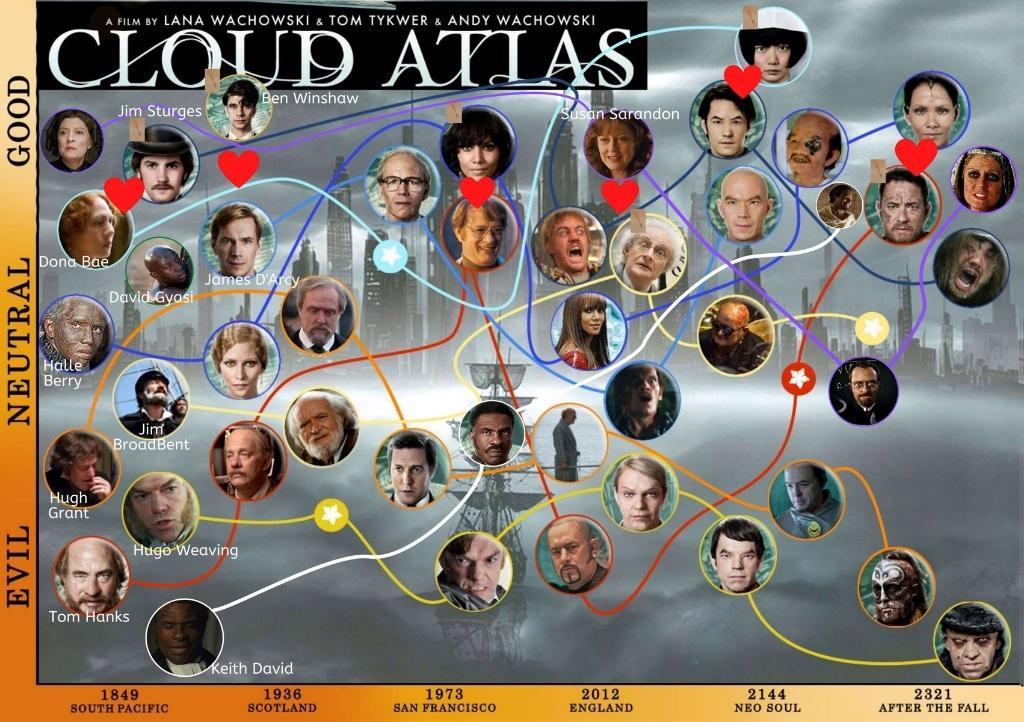

Module 24 – Grace and Grit (2021)
Soulmates
Watch this movie that is based on Ken Wilber’s book Grace and Grit: Spirituality and Healing in the Life and Death of Treya Killam Wilber (with many journal entries from Treya) to see what makes couples soulmates. One experience is that they usually recognize each other almost instantly, no matter if they are biological, transformational, or transcendental soulmates. A second quality is that they have removed all barriers to love and come from a sense of fullness instead of need or lack. A third quality is that they are devoted to facing all challenges in life and avoiding nothing to live together/procreate, to learn, heal, grow, and awaken together, and to make the world a better place.
The movie weaves together these experiences and qualities of soulmates through three narratives. The first voice is that of Treya herself, taken from her private journals that span from first meeting Ken in 1984 to her death in 1989 (she insisted that Ken use these journals in order to tell their extraordinary story). The second voice belongs to Ken, who was walking this difficult path alongside Treya, step by step, not yet aware of where their story would lead. The third voice also belongs to Ken, but as the “omniscient narrator” who is lacing these narratives together and telling the story from the perspective of someone who has lived the full experience.
https://www.imdb.com/title/tt3910630/
https://www.youtube.com/watch?v=IfBxSrH5ftA
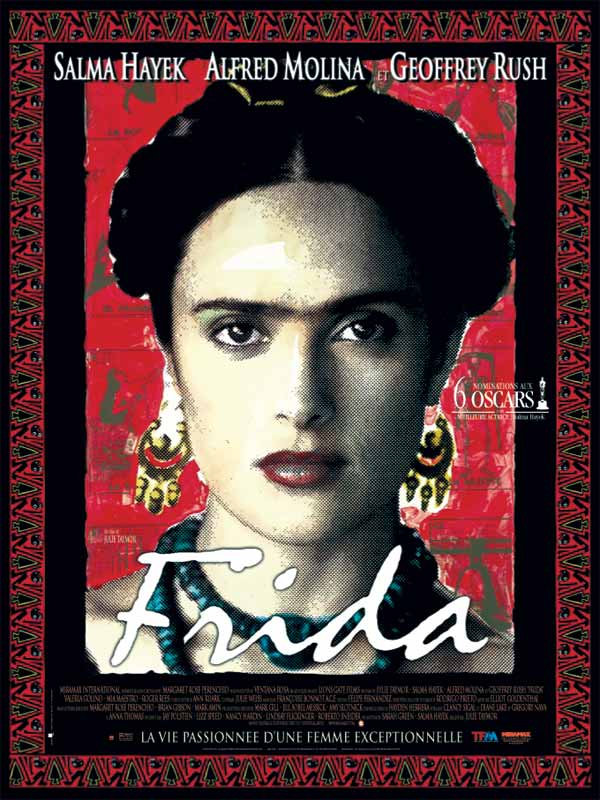
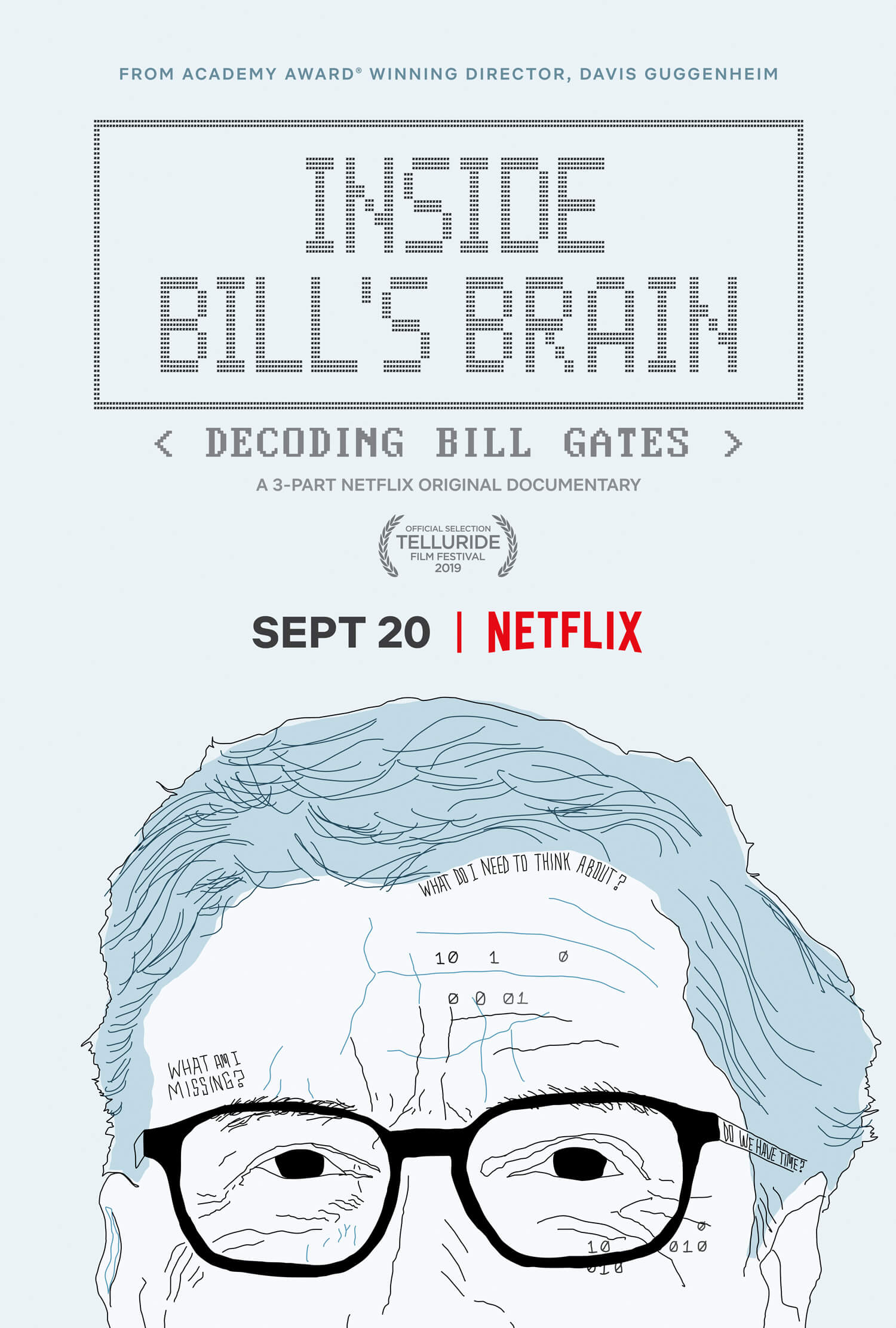
Module 25 – Frida (2002)
Co-Creation at the Seven Chakras
Watch this exceptional movie to see soulmates who share their biological, transformational, and transcendental purpose along the seven chakras to co-create more goodness, truth, beauty, and functioning to make the world a better place.
The real-life biopic “Frida” is based on Hayden Herrera’s 1983 biography of artist and political activist Frida Kahlo (1907–1954), which rescued her from obscurity and helped to transform her into a feminist icon.
We see how Frida (Salma Hayek) channeled the pain of a crippling injury from a bus accident at age 18 and her complex and tempestuous relationship with her mentor and husband Diego Rivera (Alfred Molina) into her work, as the young couple took the art world by storm. Through her provocative and romantic entanglements with women, her illicit and controversial affair with Leon Trotsky, and her provocative and uncompromising paintings, Frida lived a bold and uncompromising life, and, together with her husband Diego, became a true political (the good), artistic (the beautiful), and sexual (the truth) revolutionary.
Inside Bill’s Brain: Decoding Bill Gates (2019)
Co-Creation at the Seven Chakras
Watch this three-part Netflix documentary as an option to see the importance of co-creation with others in trying to solve the significant problems that the world is facing.
No matter what you may think personally about Bill Gates, his connection to sex offender Jeffrey Epstein, and his divorce from his wife, Melinda French Gates, you may still find aspects of this series inspiring and informative.
See how Bill lived his calling early on to solve problems or absent absences, how he co-created with others, how he seemingly became more compassionate, how he met his wife Melinda, how they co-created their foundation, and how he became driven to make the world a better place by partnering with researchers and philanthropists. See his triumphs and, even more significantly, his failures, and how he deals with both. You may find it surprisingly fascinating.
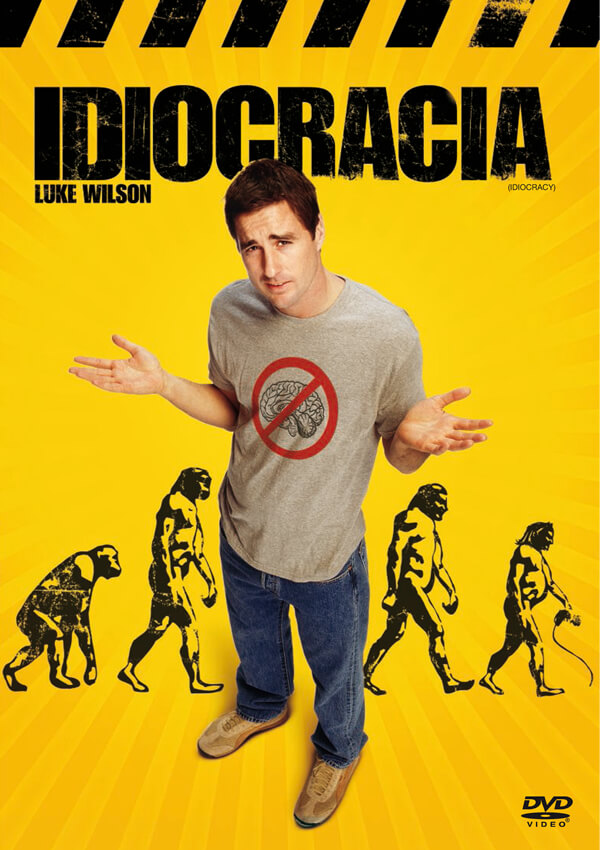
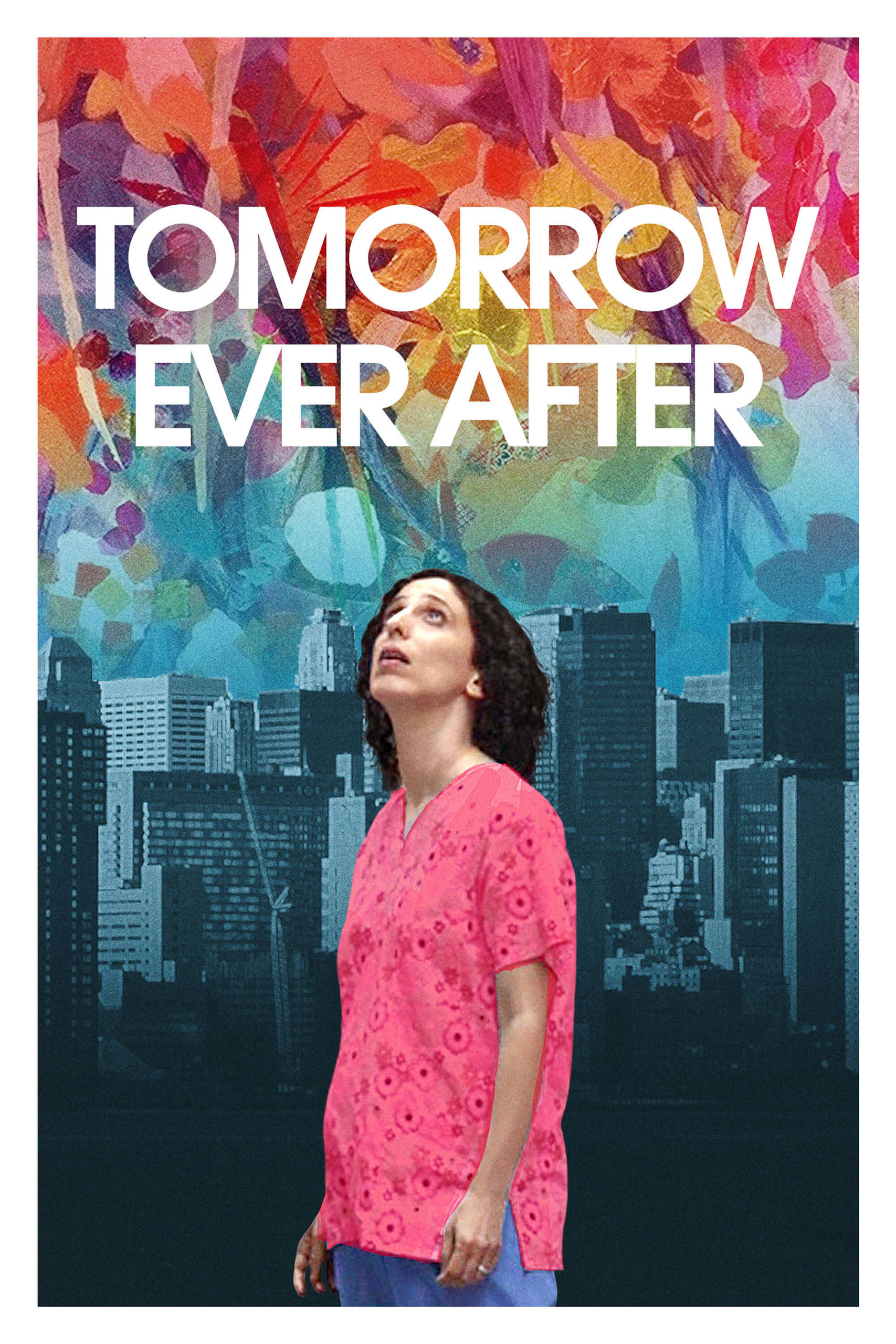
Module 26 – Idiocracy (2006)
Path to Healthy Relationships and Why they Matter
Watch this movie to see why co-creation and procreation in healthy Integral Love Relationships matter not only for our own well-being and development but even more for a peaceful and sustainable future for humanity.
The film tells the story of the two most average individuals in America, Joe Bauers (Luke Wilson), a US Army librarian, and prostitute Rita (Maya Rudolph). They are recruited to take part in a government hibernation experiment in the year 2005. Over the next five centuries, the most intelligent humans choose not to have children while the least intelligent reproduce indiscriminately, creating increasingly dumber generations. In 2505, Joe and Rita awaken in a dystopian Washington, D.C., now dumbed down by mass commercialism and mindless TV programming. Joe is eventually appointed Secretary of the Interior and later becomes the US president, after an IQ test identified him as the most intelligent person alive.
Unfortunately, we now see that this movie is not just a silly comedy but feels increasingly like a documentary, as it becomes a reality in front of our very eyes.
See the political, social, and ecological implications of the fact that people at postconventional levels of consciousness development procreate much less than people at earlier levels and how this may impact our future.
Tomorrow Ever After (2016)
Path to Healthy Relationships and Why they Matter
Watch this movie to see a reverse perspective from the dystopian world in the year 2505, as shown in Idiocracy. This touching micro-budget production holds up a mirror to our modern materialistic societies and fraught human relationships and suggests what we can do about it by furthering the Integral Relationship vision.
In the film, we see a historian from the year 2592 who time-traveled to 2015 New York. There, she has to navigate the societal woes that she had read about in history books as “The Great Despair,” a horrible period filled with pain, exploitation, greed, pollution, and loneliness.
Throughout the story, she continues to act with the expectation that people will be good, caring, responsible, and helpful. In part, she is crushingly disappointed, and it keeps causing problems. In part, her expectation and her earnest, obvious intentions to do good cause some people around her to become more caring.
Other Integral Movies
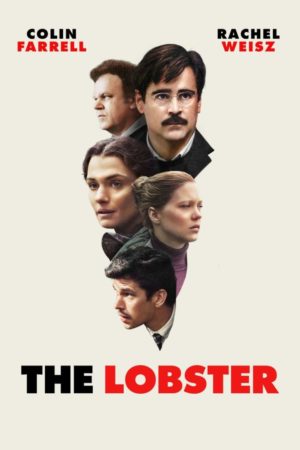
The Lobster
Sexual Development
In a dystopian near future, single people, according to the laws of The City, are taken to The Hotel, where they are obliged to find a romantic partner in forty-five days or are transformed into an animal of their choice and sent off into The Woods.
In a world devoted to happy endings, where platitudes like “the right person is out there waiting for you” or “someday your Prince will come” are parroted as Unquestioned Truths, the film is a welcome breath of freezing cold, poisoned air.
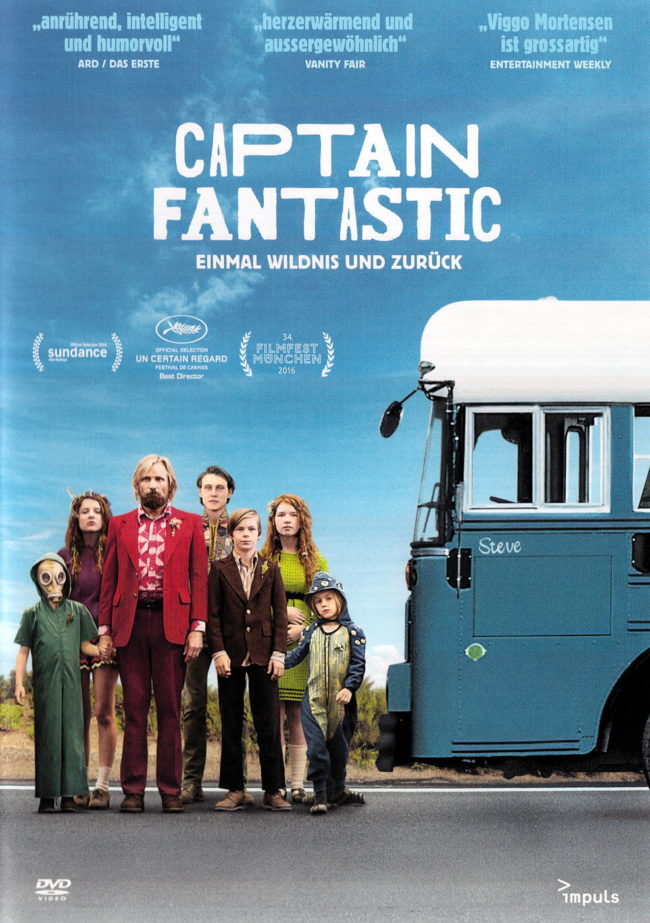
Captain Fantastic
Watch this movie for our exploration of the Green pluralistic “sensitive self” Stage 6, with all its beauty and advancements, but also with its challenges, performative contradictions, and pre-trans fallacies.
In the forests of the Pacific Northwest, a postmodern father who escaped the Orange materialistic and Blue/Amber mythic law and order stages is devoted to raising his six children with a rigorous physical and intellectual education.
Eventually, he is forced to leave his paradise and face the world that he tried so hard to escape, while challenging his idea of what it means to be a parent.
https://www.imdb.com/title/tt3553976/
https://www.youtube.com/watch?v=D1kH4OMIOMc
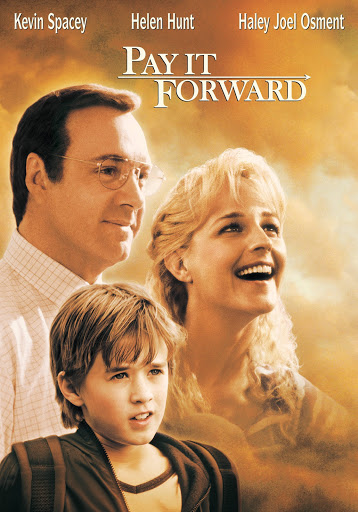
Pay It Forward
Young Trevor McKinney, troubled by his mother’s alcoholism and fears of his abusive but absent father, is caught up by an intriguing assignment from his new social studies teacher, Mr. Simonet. The assignment: think of something to change the world and put it into action. Trevor conjures the notion of paying a favor not back, but forward–repaying good deeds not with payback, but with new good deeds done to three new people. Trevor’s efforts to make good on his idea bring a revolution not only in the lives of himself, his mother, and his physically and emotionally scarred teacher but in those of an ever-widening circle of people completely unknown to him.
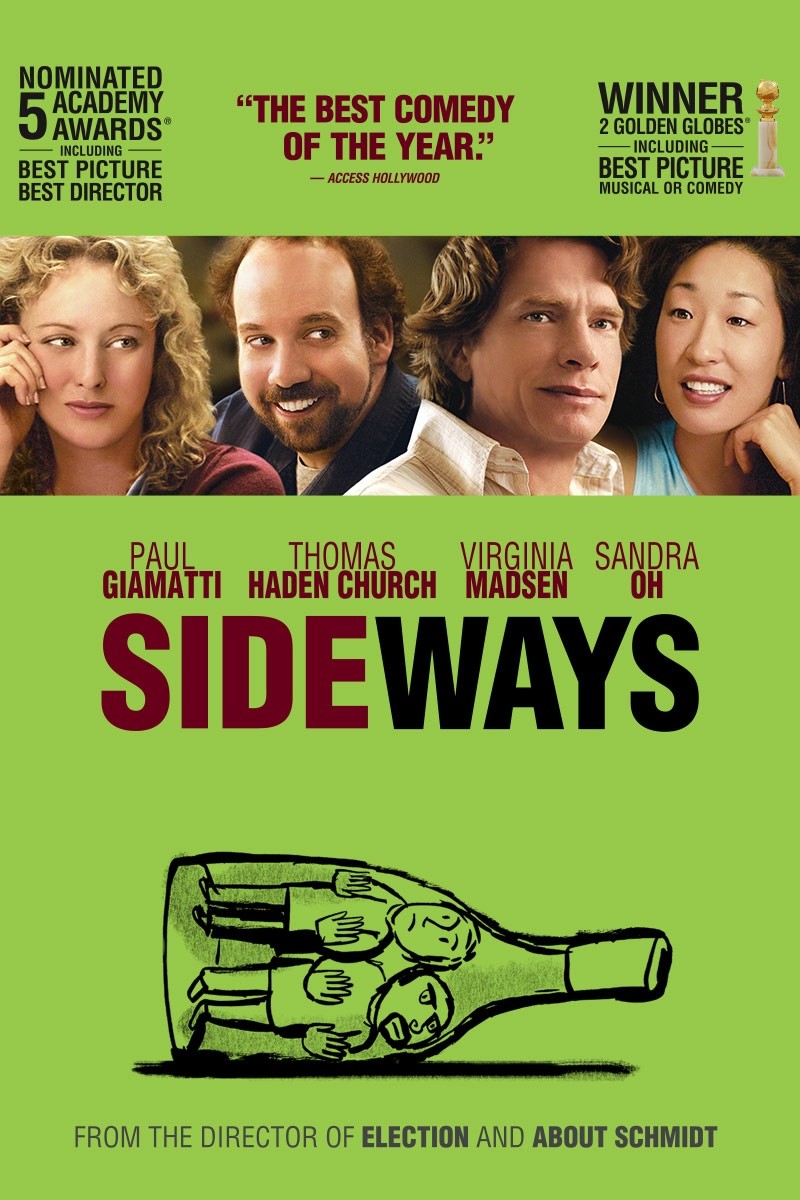
Sideways
Let us laugh out loud and cringe together during this painfully funny comedy (depending on your perspective) and discuss it afterwards. A week before his friend Jack is to be married, best man Miles and the prospective groom head off to wine country for a week of fun, relaxation and – of course – wine drinking. Miles is the oenophile and does his best to teach Jack a bit about the art of appreciating great wine. All Jack cares about is drinking and carousing, something he accomplishes when he meets the attractive Stephanie at one of the vineyards. Miles is something of a sad sack, a high school English teacher who is a failed writer at heart. He has yet to get over the fact that his wife has divorced him and that she has remarried and he now faces that nerve-racking wait for word from a prospective publisher. Miles has an opportunity to start anew when he meets Stephanie’s friend Maya but when he let’s slip that Jack is about to be married any hope of a relationship seems to be lost.
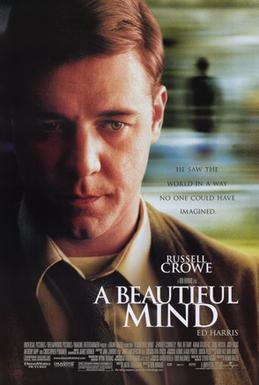
A Beautiful Mind
Join us to watch this Academy Award winner for Best Picture, Directing, and Supportive Actress about the two biggest insights that John Nash made in his life. One “that it is only in the mysterious equation of love that any logic or reasons can be found,” and that “if we all go for the blonde and block each other, not a single one of us is going to get her. So then we go for her friends, but they will all give us the cold shoulder because no one likes to be second choice. But what if none of us goes for the blonde? We won’t get in each other’s way and we won’t insult the other girls. It’s the only way to win. It’s the only way we all get laid.
”From the heights of notoriety to the depths of depravity, John Forbes Nash, Jr. experienced it all. A mathematical genius, he made an astonishing discovery early in his career and stood on the brink of international acclaim. But the handsome and arrogant Nash soon found himself on a painful and harrowing journey of self-discovery. After many years of struggle, he eventually triumphed over his tragedy, and finally – late in life – received the Nobel Prize.
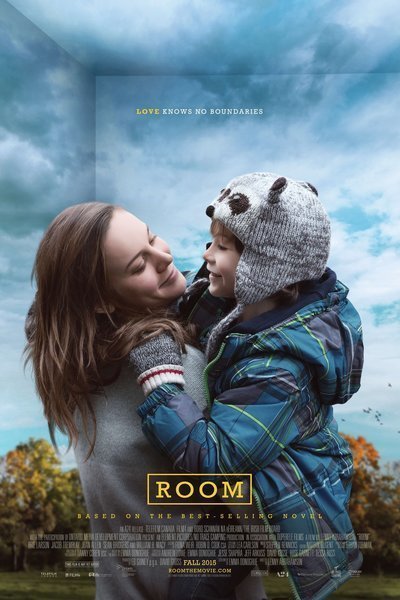
Room

Inception

Lucy
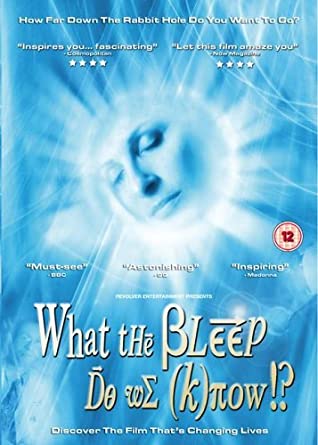
What the #$*! Do We (K)now!?
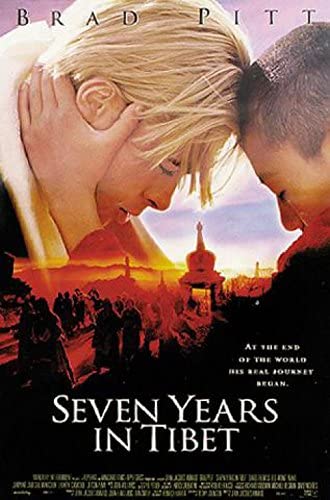
Seven Years in Tibet
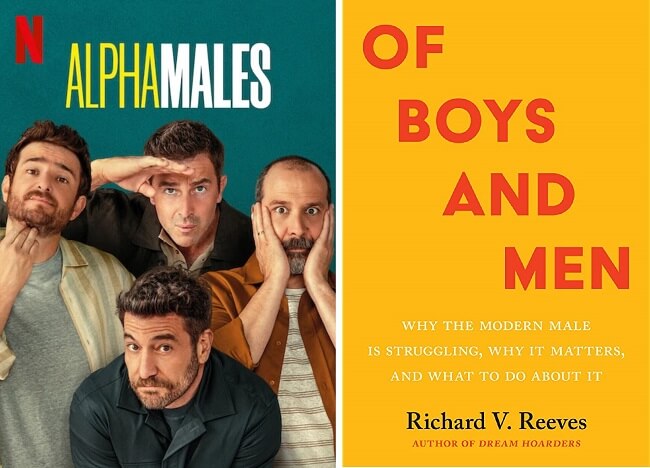
Alpha Males
Related to the book “Of Boys and Men: Why the Modern Male Is Struggling, Why It Matters, and What to Do“, by Richard Reeves, the Netflix Series Alpha Males depicts the challenges that many men face, but neither offer Integral solutions that you find at the end of this Blog Post.
In Alpha Males, we see four male friends with varying levels of “toxic” masculinity struggling in their life and romantic relationships with female partners with varying degrees of healthy AND unhealthy (toxic) femininity and motherhood.
In Of Boys and Men, Reeves provides a staggering amount of sex-, gender-, class-, and race-differentiated research and statistics on how boys and men are increasingly falling behind in education, the workplace, as partners, and as fathers, as shown in Alpha Males.
https://www.youtube.com/watch?v=OlhLOWTnVoQ
https://www.imdb.com/title/tt1542344/?ref_=fn_al_tt_1
Stage 2 – Quest For Fire by Jean Jacques Annaud
https://youtu.be/EOtOkNgdZTU
https://www.imdb.com/title/tt0082484/?ref_=nm_ov_bio_lk1
(Netflix) * Stage 2/5 Room by Lenny Abrahamson (Cognitive Prison)
https://www.youtube.com/watch?v=E_Ci-pAL4eE
https://www.imdb.com/title/tt3170832/?ref_=fn_al_tt_1
Stage 3 – Natural Born Killers by Oliver Stone
https://www.youtube.com/watch?v=zVizhLGaEmk
https://www.imdb.com/title/tt0110632/?ref_=fn_al_tt_1
Stage 4 – Rabbit Proof Fence by Phillip Noyce
https://www.youtube.com/watch?v=Lbnk8wSVMaM
https://www.imdb.com/title/tt0252444/?ref_=nv_sr_srsg_0
(Netflix) * 3 -> 4 – Seven Years in Tibet by Jean-Jacques Annaud
https://www.youtube.com/watch?v=LSyr_vJ5t3k
https://www.imdb.com/title/tt0120102/?ref_=fn_al_tt_1
Stage 5 – The Wolf of Wall Street by Martin Scorcese
https://www.youtube.com/watch?v=idAVRvQeYAE
https://www.youtube.com/watch?v=pabEtIERlic
https://www.imdb.com/title/tt0993846/?ref_=fn_al_tt_1
(Netflix) Stage 6 – Into the Wild by Sean Penn
https://www.youtube.com/watch?v=g7ArZ7VD-QQ
https://www.imdb.com/title/tt0758758/?ref_=fn_al_tt_1
Stage 6 – La Belle Verte by Coline Serreau
https://www.youtube.com/watch?v=HiuVYBpeK-g
https://www.imdb.com/title/tt0115650/?ref_=fn_al_tt_1
Stage 7 – Ted talk
https://www.ted.com/talks/thordis_elva_and_tom_stranger_our_story_of_rape_and_reconciliation
Other suggestions from Participants
Stage 5 – The Beauty Inside by Jong-Yeol Baek
https://www.youtube.com/watch?v=Ly7rq5EsTC8
https://www.imdb.com/title/tt0169547/?ref_=nv_sr_srsg_0
